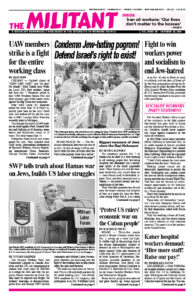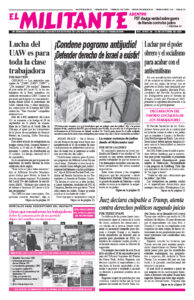LOS ANGELES — Over 75,000 Kaiser hospital workers carried out a three-day strike Oct. 4-6 in California, Oregon, Washington and Colorado. Kaiser workers in Virginia and the District of Columbia went out for one day. The central issues are the need for more staffing to cut the workload and improve patient care, as well as higher wages in face of today’s high prices.
The strike was carried out by a coalition of unions, including SEIU-United Healthcare Workers West, which represents 60,000 of the workers. The strikers included licensed vocational nurses, X-ray technicians, surgical technicians, phlebotomists, certified nursing assistants, pharmacy technicians, respiratory therapists, as well as housekeepers and food service workers.
Union leaders say that if Kaiser refuses to meet workers’ demands, a longer and bigger strike could be called in November.
Over the three days, hundreds of workers joined the picket line at Kaiser South Bay in Los Angeles. “We’re fighting to get more staffing. They need to hire more people. This is necessary for the quality of patient care,” striker Maureen Ibarra, an ultrasound worker in the cardiac unit here, told the Militant. “Patients have long waits to get an appointment with their primary doctor, a long wait to get results from tests, long waits to get other appointments.
“Burn out from overwork is a problem,” she said.
“Staffing and wages are the biggest issues for me,” said Sam Tecson, an eight-year worker in Kaiser’s pulmonary department. “They pulled some benefits away and now with inflation we need higher pay. We need to support each other, that’s why I am out here.”
Hundreds of workers also took part in the picket lines at the Cadillac Avenue Kaiser Hospital in West Los Angeles. “We work for patients. They don’t care about patients, only the CEO’s pay,” anesthesiologist Maria Felix, who has worked at Kaiser for 27 years, said. “We help doctors intubate people, we monitor, troubleshoot and take care of the anesthesia machine. I’m not so concerned about a bonus but a raise because the cost of living is so high.”
Kristian Huling came to support the picket line from Service Employees International Union Local 721, the largest public workers’ union in Southern California. “Health care is not a privilege, it is a right,” she told strikers. “I represent 721 standing in solidarity. We need to stand together against corporate greed.”
“Local 721 represents county workers,” Huling told the Militant. “They want to increase what we pay for health care by 10% or higher.”
Bakery worker union member Alma Padilla joined this fellow union member and Militant correspondent in bringing solidarity and joining discussions at the picket lines during two days of the strike, before going to work on the afternoon shift.
“I went to the picket line because I want to support people. Our purpose is the same. The union is strength. Everything is going up — food, housing — while we get a miserable wage,” Padilla said. “This is my second experience in protests. When I saw a hotel workers strike picket line I participated. I want for us to be heard and for all workers to get a raise because we do all the work.”
Longshore union members, striking SAG-AFTRA actors and other area unionists also joined the picket lines.
Norton Sandler contributed to this article.
‘Fight for more staffing is at heart of workers’ demands’
SAN LEANDRO, Calif. — Hundreds picketed outside the Kaiser hospital here every day of the hospital workers’ three-day nationwide strike. Spirits were high on the line.
Joining strikers from SEIU-United Healthcare Workers West were Kaiser office workers, who are members of Office and Professional Employees International Union Local 29. “My co-workers asked me if I was going to strike,” one OPEIU member told the Militant. “Of course, I told them. This is the first time that the OPEIU has been on a called strike in the 32 years I’ve worked at Kaiser. And because of that we have always trailed in wages.”
Melissa Rodriguez, a technician in the emergency department, said, “Kaiser says it is a ‘nonprofit.’ They made $1 billion. Show me how it is a nonprofit! They made money hand-over-fist during the COVID pandemic.
“Untrained scabs are doing our work now,” she said. “Security guards are doing sanitation, including in sterile areas where you need special training.
“I prepared for this strike by paying my bills ahead. We are fighting for a raise so we can save for the future,” she said.
A stationary engineer named Keith joined the line to give support. He knew the Militant from the support the paper gave Engineers Local 39 during their strike against Kaiser two years ago. They were on the line in front of the hospital 24/7. “We were out for 92 days,” he said. “Kaiser gave us nothing. They didn’t even talk to the union for a year and a half after the strike. We finally had a meeting this past August, and Kaiser had the nerve to say it was the union that finally agreed to meet.”
Several registered nurses, members of the California Nurses Association, joined the line. “We got our contract,” Tanya Hopkins said, “so we aren’t on strike, but we come out to support the other workers after we finish our shift. And when the engineers were on strike, we struck for two days to support them. They still don’t have a new contract.”
Striking United Healthcare Workers West member Miguel Bernaola works two jobs as a Certified Nursing Assistant. “CNAs are the first ones to feed, clothe, bathe, and listen to the patients, but Kaiser doesn’t pay attention to our concerns,” he said. “If you don’t meet a 30-day deadline for recertification, you can lose your benefits and they will put you on as a new hire.”
Bernaola is fighting to have CNA recertification expedited. “It’s the fault of the facility, not just the government,” he said. “No one in management is focused on the needs of the workers on the floor.”
“They hire more management, but it’s on the floor where we need more people,” The fight for more staffing is at the heart of the workers’ demands.
“This is a three-day strike,” Bernaola said. “But if we have to go back out in November, it will be a regular strike. My goal is set on winning a four-year contract.”
— Eric Simpson

